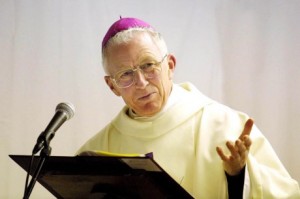
By Sarah Mac Donald - 22 August, 2013
 Bishop Philip Boyce of Raphoe has urged lay people to hold fast to the faith which has been handed down from generation to generation.
Bishop Philip Boyce of Raphoe has urged lay people to hold fast to the faith which has been handed down from generation to generation.
In his homily delivered in Knock for the annual novena, Bishop Boyce drew attention to the difficult times the country and many of its citizens were going through, from an economic, social or religious point of view.
Some have lost their employment or cannot get a job, while the “spectre of emigration has become a harsh reality for hundreds of thousands of young people,” he said. Others dread the day of the mortgage payment that “cripples their spirit.”
He warned that there were “new poor” in our midst. Families who were comfortable or well-off a decade ago, were now doing their best simply to survive, and may well have had to appeal at times for help from the Society of Saint Vincent de Paul.
Assessing the current context for the Catholic Church in Ireland, he said it had seen the number of vocations fall “dramatically”, while Mass attendances and attendances at the Sacraments had noticeably reduced due to the “effects of recent scandals and infidelities weighing heavily upon” the Church.
Young people, while retaining many good and generous qualities, are less interested in religion and find it very difficult to make long term commitments, he said.
Meanwhile the pace of change in technology was “mesmerising for many”.
“New gadgets are continually coming on the market and advertised in the media. Middle aged or elderly generations have often given up the race, and are at sea in a new digital age, where they leave it all to their children and grandchildren,” Bishop Boyce commented.
He noted that despite so much social contact, loneliness affects many in the midst of the feverish pace of life.
“We live in a new and ever-changing culture, that is often impervious to traditional faith values,” the Bishop warned. In this context, he suggested, it is “faith that saves and sustains us when we are hard pressed.”
Apart from instruction in what we believe, we also have to live our faith and bear witness to the overriding love of Christ in our lives, the Bishop noted.
Addressing the challenging context for the Church, the Bishop said that in the difficult times we face, it is the whole Church that must give joyful witness to Christ. “This work cannot be left to the ordained clergy,” he underlined.
Lay people, by virtue of their baptism and the strength of the Spirit given in Confirmation, have to permeate society with the leaven of the Gospel, the Bishop suggested. In good times as in bad times they have to hold fast to the faith that was handed down for generations, he suggested.
“Faith at the difficult times in which we live is not a cheap grace but a costly one. Being and living as a Catholic Christian means letting our faith influence our daily conduct, our actions and decisions,” he said.
Challenging times should not simply be seen as an obstacle to faith. They can also be stepping stones to a deeper faith he said and quoted from Quoist: “for just as a dam forces the river to rise to a new level, our difficulties force us to rise to a new level of faith.”